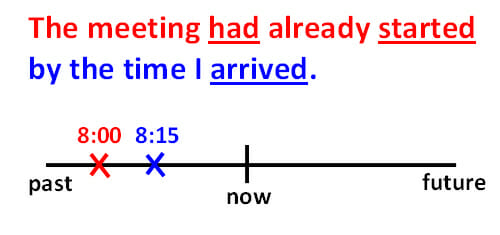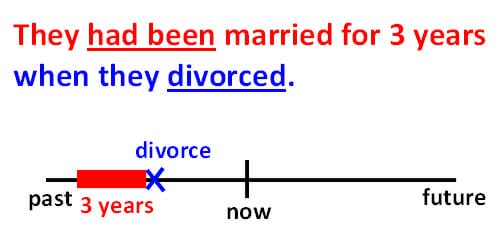Past Perfect Verb Tense in English
The past perfect is “the past before the past.” You can use it to talk about an event that happened before another event in the past. The past perfect is formed with:
had + past participle
- I had studied English for several years before I traveled to the U.S.
- I hadn’t studied English before I traveled to the U.S.
- Had you studied English before you traveled to the U.S.?
Past Perfect Example 1
Imagine you are late for work on the day of an important meeting.
- The meeting started at 8:00
- You arrived at 8:15
“The meeting had already started by the time I arrived.”

Past Perfect Example 2
Imagine that there is a husband and wife who got divorced last year. Before the divorce, they were married for 3 years:
- They were married from 2008-2011.
- They got divorced in 2011.
They had been married for 3 years when they divorced.

It’s common to use the short form ‘d:
- They‘d been married 3 years when they divorced.
- When I checked my cell phone, I saw that she‘d called me twice.
- By the end of the day, I‘d written two hundred e-mails.
“Had had”?
With the past perfect, it’s possible to have the structure “had had” and “hadn’t had” in a sentence, when “had” is both the auxiliary verb and the main verb. In these cases, it’s very common to use the short form: ‘d had.
- I had had five different jobs by the time I was 30 years old.
I‘d had five different jobs by the time I was 30 years old. - When I saw him, I could tell that he had had too much to drink.
When I saw him, I could tell that he‘d had too much to drink. - I told my boss that I hadn’t had enough time to finish the project.
- We had never had an argument until last week.
Signal Words for the Past Perfect
In general, these words (only when used about a situation in the past) signal the use of the past perfect in the sentence:
- By the time
I‘d finished all the work by the time you called. - When
When we arrived at the airport, our flight had already left. - Before
Before we sold our car, we had owned it for 12 years. - Until
He‘d never met a native English speaker until he visited London. - Said
She said that she‘d lost her wallet.
Note: The simple past and the past perfect are often in the same sentence, but not necessarily. It’s possible for the first sentence to establish the “context” of the past, and for following sentences to be in the past perfect:
- I first met John in 2001. He had been looking for work for the past two years. Although he had gone for interviews in several big companies, nobody had hired him.
Learn more English verb tenses!
Quiz: Past Perfect Exercises
Question 1 |
A | was / had met |
B | had been / met |
Question 2 |
A | realized / I'd forgotten |
B | 'd realized / I forgot |
Question 3 |
A | didn't try / 'd gone |
B | had never tried / went |
Question 4 |
A | had been waiting / arrived |
B | waited / had arrived |
Question 5 |
A | 'd asked / I brought |
B | asked / I'd brought |
Question 6 |
A | turned / had already won |
B | had turned / won |
Question 7 |
A | didn't grow / hadn't rained |
B | hadn't grown / didn't rain |
Question 8 |
A | had slept / they went |
B | slept / they'd gone |
Question 9 |
A | had arrived / already died |
B | arrived / had already died |
Question 10 |
A | asked / had already lent |
B | had asked / already lent |










